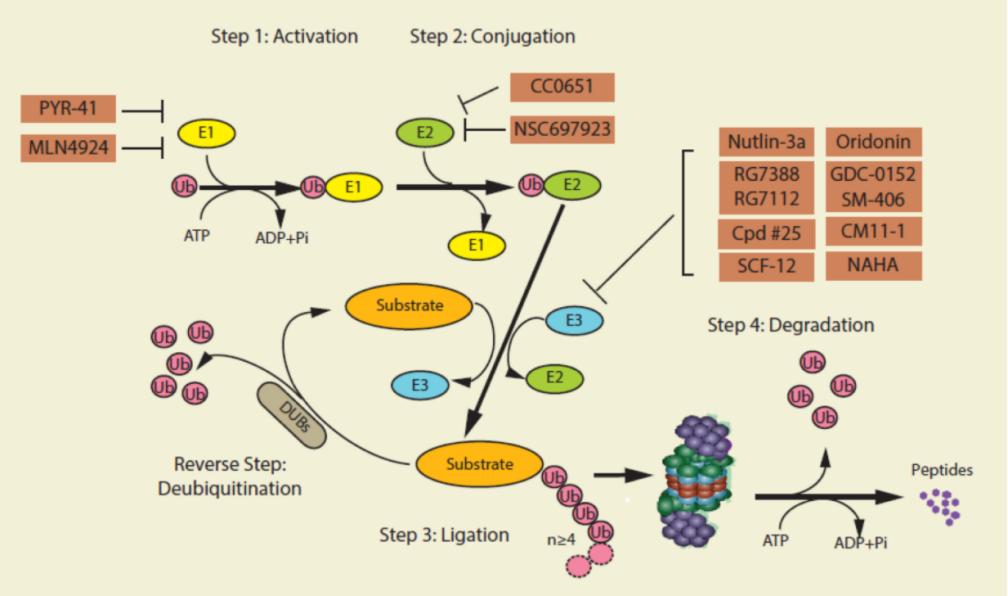BOC Sciences is a leading CRO providing innovative drug discovery services. In recent years, we have focused on drug discovery based on the ubiquitin-proteasome system (UPS), providing research tools for small-molecule targeted drugs to better assist our clients and accelerate their new drug development processes. It is worth mentioning that the PROTAC technology uses the cell's own UPS to induce the degradation of target proteins, and our services cover all aspects of PROTAC® development.
Introduction
The ubiquitin-proteasome system (UPS) is the major pathway for the degradation of intracellular proteins in eukaryotic cells. Proteins that are tagged with multi-ubiquitins are recognized and degraded by the proteasome. Nobel Prize in Chemistry 2004 was awarded jointly to three scientists for discovering ubiquitin-mediated protein degradation.
Protein ubiquitination is mediated by a series of ubiquitinating enzymes, which are ubiquitin-activating enzyme E1, ubiquitin conjugase E2, and ubiquitin ligase E3. First, ubiquitin is activated by hydrolysis of ATP to form a thioester bond between the carboxyl terminus of ubiquitin and the active site cysteine of E1. Then, ubiquitin is transferred to E2 and subsequently attached to the active group (e.g., lysine residue, N-terminal amino group) by E3 in the substrate. Additional ubiquitin molecules bind to the first ubiquitin molecule, forming a poly-ubiquitinated target protein recognized by the proteasome and leading to substrate degradation.
 Fig 1. The ubiquitin-proteasome system (Zhang, 2020)
Fig 1. The ubiquitin-proteasome system (Zhang, 2020)
Scientists have designed to use the naturally occurring intracellular protein degradation systems to degrade disease-associated proteins for disease treatment. The UPS-based targeted protein degradation technology consists mainly of PROTAC (proteolysis-targeting chimera) and molecular glue. The characteristics of PROTACs and molecular glues are listed below:
| | PROTAC | Molecular glue |
|---|
| Mechanism | Binds target and E3 | Binds E3 or target protein to induce PPI |
| Target protein | Predictable | To be determined |
| Discovery strategy | Rational design | Historically serendipitous discovery |
| Feature | Bivalent | Monovalent |
| Linker | With linker | Without linker |
| Rule of five | Beyond | Typically with |
| Binding pocket in the target protein | Required | Nonessential |
Table 1. Characteristics of PROTAC and molecular glue (Dong, 2021)
Services for UPS-Based Degradation Technology Development
- Our UPS-based protein degradation technology supports the discovery, design, development, and evaluation of innovative molecules.
- We provide customized and alternative drug development services for protein degradation to meet customers' individual needs.
- We offer comprehensive PROTAC® development services, such as ligands and linkers design.
- We offer molecular glue development services, including natural molecular glues modification and synthetic molecular glues design.
Our Advantages
- Multiple UPS-based targeted protein degradation technologies to meet customers' needs
- Advanced platform and technology
- Experienced scientific team
- Highly reliable and reproducible result
- Data analysis, detailed report with results and discussion
- Quality one-stop service
- Short turn-around time and competitive price
Project Workflow

References:
- Gong, B., et al. The Ubiquitin-Proteasome System: Potential Therapeutic Targets for Alzheimer's Disease and Spinal Cord Injury, Front. Mol. Neurosci., 2016, 9:4.
- Dong, G., et al. Molecular Glues for Targeted Protein Degradation: From Serendipity to Rational Discovery, J. Med. Chem., 2021, 64(15), 10606-10620.
- Zhang, X., Linder, S., and Bazzaro, M., Drug Development Targeting the Ubiquitin-Proteasome System (UPS) for the Treatment of Human Cancers, Cancers, 2020, 12(4), 902.

 Fig 1. The ubiquitin-proteasome system (Zhang, 2020)
Fig 1. The ubiquitin-proteasome system (Zhang, 2020)
